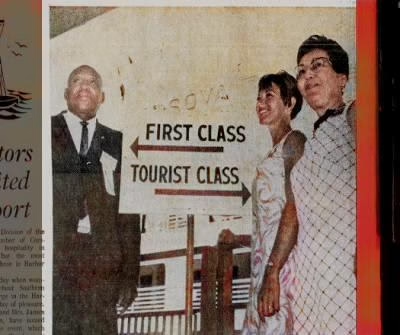This past January, Warren Chapel CME Church celebrated its 80th anniversary. Regardless of denomination, a church is formed when two or more believers come together in worship, teaching, and fellowship. While the church’s mission is to spread the gospel and make disciples, the Church has had to speak on the material realities of its believers, which included confronting racism and racial discrimination in employment and housing. Mount Sinai Baptist Church was the first black church in San Pedro to engage in this work starting in 1924. The work was just getting started by the 1940s. And where Mt. Sinai had Rev. D. Robert Cofield, Warren Chapel had one of its founding trustees, Deacon Sam Flood.
 Flood was a man of deep Christian convictions and a lifelong advocate for workers’ rights, racial equality, and community development. Born on June 6, 1897, in Kansas City, Missouri, Flood was the son of a preacher. Despite his religious upbringing, he chose to serve in the U.S. Navy during World War I, enlisting in Colorado. In the early 1930s, he moved to Shreveport, Louisiana, where he joined the Veterans of Foreign Wars (VFW) and worked at a meat processing plant. By 1943, he relocated to San Pedro, California, finding employment as an electrician at Todd Shipyards and beginning a decades-long career in labor and community activism.
Flood was a man of deep Christian convictions and a lifelong advocate for workers’ rights, racial equality, and community development. Born on June 6, 1897, in Kansas City, Missouri, Flood was the son of a preacher. Despite his religious upbringing, he chose to serve in the U.S. Navy during World War I, enlisting in Colorado. In the early 1930s, he moved to Shreveport, Louisiana, where he joined the Veterans of Foreign Wars (VFW) and worked at a meat processing plant. By 1943, he relocated to San Pedro, California, finding employment as an electrician at Todd Shipyards and beginning a decades-long career in labor and community activism.
Flood played a crucial role in advocating for African American workers’ rights in an era when unions were largely unwelcoming to Black workers. He became vice president of Local 9 of the United Marine Shipbuilding Workers of America, serving in this capacity for 17 years. Beyond his work in labor unions, he was deeply involved in civic and service organizations, including the San Pedro Chamber of Commerce, the American Legion, the Veterans of Foreign Wars, The San Pedro Coordinating Committee, and the Mayor’s Advisory Council. He also served as chaplain of the World War I Barracks.
His faith guided his deep commitment to equality and justice. In a 1972 interview with the Daily Breeze, Flood stated:
“My Christian experience makes me have feelings for my brother, and I know no boundaries of mankind. Every man is a man with me, and I’m thankful for the knowledge to know that I can be like that. I feel that with all the critical times now, every man ought to learn to practice that type of attitude. I’ve always tried to do the things that I thought were right, and I try to put oil on troubled waters.”
Flood’s activism extended beyond labor rights. He was an advocate for public housing and fair housing policies in San Pedro. As a founding trustee of Warren Chapel CME Church, he understood the importance of addressing the material conditions of his community alongside spiritual guidance. He was instrumental in organizing residents of Banning Homes, a temporary workforce housing project, to secure permanent low-income housing when Banning Homes was slated for demolition. He opposed plans to transfer the site to the National Guard as a training ground, instead pushing for it to remain a resource for displaced families.
In the late 1960s, as the Beacon Street Redevelopment Project threatened to displace working-class residents, Flood partnered with Pastor Ulysses L. Butts of Warren Chapel CME Church, the Greater Peninsula Council of Churches, and the League of Latin American Citizens to form the nonprofit Verdes del Oriente. Their efforts led to the development of Verdes del Oriente Apartments and the Harbor Towers for seniors to provide affordable housing for those impacted by redevelopment.
Flood was known for his relentless dedication to people and his community. Even after retiring from the shipbuilding industry, he remained deeply involved in civic affairs. When asked why he continued working so tirelessly, he responded:
“To keep from becoming stagnant. You have to keep active. Besides, I’m just interested in people and like to do good wherever I can.”
Sam Flood and his wife, Regina, were residents of the Los Angeles Harbor area for more than 30 years. Until his passing in 1973, he remained a steadfast advocate for justice, equity, and community welfare. His life’s work left an enduring impact on labor rights, civil rights, and affordable housing in San Pedro, cementing his legacy as a champion for the people.



